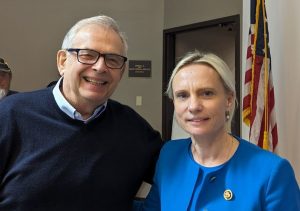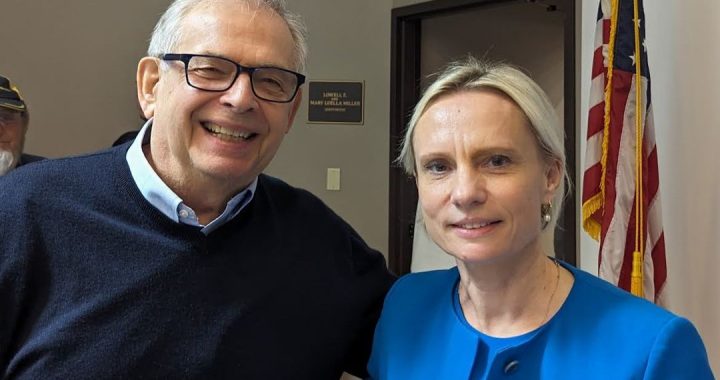February 13, 2024
By Victor Kubik
Since the founding of LifeNets International some 25 years ago, from time to time we’ve met or worked with a number of public figures, including elected officials. Notable of course is our long-time relationship with former Indiana First Lady Judy O’Bannon, who supported LifeNets’ direct connection with the Ukraine-based Revival Centre in Chernihev near Chernobyl. As many know, I was also able to join the then-First Lady’s extensive formal tour of Russia, back then quite a different nation than today.
That Chernihev/Chernobyl connection came to the fore again recently. After following her staunch support of Ukraine against the Russian invasion for the past two years, I was able to recently meet and briefly talk with Congresswoman Victoria Spartz of Indiana. She offered a unique perspective.

The Honorable Victoria Spartz and Victor Kubik
An unusual career
You may be interested in her background. Known as a forceful conservative leader, Congresswoman Spartz’s career reflects an unusual trajectory. Born in the Chernihev Oblast in northern Ukraine (where LifeNets has been active for many years), Spartz immigrated to America in 2000 after earning a bachelor's degree in business and an MBA from Kyiv National Economic University. She married her Indiana husband (then stationed in Europe) that same year and went on to earn both a master’s degree in accountancy from the Kelley School of Business at Indiana University and a CPA license.
The Spartz’s settled on a farm near Noblesville, Indiana. After taking a position as CFO of the Indiana Attorney General’s office and later serving in the Indiana Senate, Spartz was elected to Congress in 2020 as the nation’s first Ukrainian-born female member and the first member born in a former Soviet Republic.
Congresswoman Spartz is not afraid to speak her mind, calling the 2022 Russian invasion “a genocide of the Ukrainian people.” One of the first U.S. officials to travel to Ukraine after the Russian war started (her grandmother still lives in Ukraine), the Congresswoman has lent an active voice.
She recently conducted a Town Hall near where I live in Indiana, so I attended to hear her views directly. I have been following her in the news not only because of our common heritage, but because of her attachment and keen involvement in the senseless war that has killed hundreds of thousands of people including many civilians and children. Some victims have been members of my family and friends in regions of Ukraine that I have worked in for decades. The U.S. House of Representatives appropriates federal funding and she is therefore influential in decisions that are made to supply aid to Ukraine in a very difficult time.
War “not going well”
The bottom line? Congresswoman Spartz told us frankly that the war is not going well for Ukraine as it approaches the two-year mark. How long can Ukraine bleed in the confrontation with a much larger cruel bully that has oppressed its people on and off for centuries? If Ukraine loses, it will be sent back to an abused and impoverished state living among the richest resources in agriculture and minerals in the world.
In her public remarks, she fielded several constituents' questions about the Southern Border immigration crisis, inflation, and the economy.
But she also clarified the aid packages allocated to Ukraine. The federally appropriated funding is distributed broadly and covers other military actions, such as those in Yemen. The money follows a complex route and is not as some people think, just sent directly to Ukraine for government disbursement. Much of the authorized funding, if not most, actually is directly invested in the U.S. defense industry as armaments that are shipped to Ukraine are manufactured here. She noted that there are many misconceptions about military spending and how the help is actually delivered.
LifeNets work in Ukraine
Following her public remarks, the Congresswoman and I were able to briefly talk. LifeNets was originally founded from humanitarian efforts to provide relief for the children victims of the Chernobyl nuclear disaster, which disaster of course the Congresswoman was personally familiar with. I presented her with the latest pictorial calendar of LifeNets, which details LifeNets’ broad global scope of humanitarian work – including aiding Ukraine children war victims. I found her to be generous in spirit and enthusiastically appreciative of our mutual connection.
The Congresswoman recently announced her intent to stand for re-election for a third term. While LifeNets is apolitical, the Congresswoman’s continued support for Ukraine is of interest and I hope to meet again, particularly as LifeNets renews its support for noncombatant Ukrainian relief and aid

